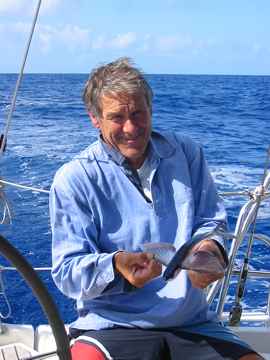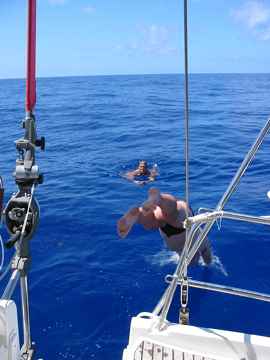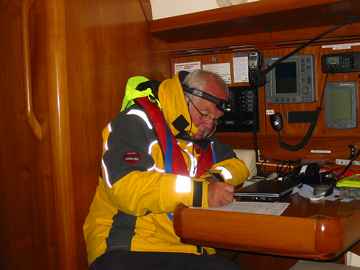North to Bermuda

Whitemeadow
Phil Pascoe
Tue 19 May 2009 15:04
|
32:22.53N 60:40.38W
St. George’s Harbour, Bermuda. Another
epistle from Dave:
The longest single passage I had sailed before this
trip was about 100 miles, and the longest time spent on a single passage before
leaving a boat for terra firma was approximately 24 hours. I was now
setting out to travel some 800+ miles which would take about 7 days and once
started there would be no turning back. There were lots of un answered questions
passing through my mind as we set off for Bermuda. Would I suffer sea
sickness? I never had in the past. How would I
mentally/physically cope with being restricted to an area the size of my lounge
that was constantly moving? Would I need to undertake regular
exercises? Would I find such a long single voyage as pleasurable as much
shorter ones where excursions ashore breaki up the day? Would the three of
us get on or would we get on each others nerves? (I have never spent so much
time locked up with two men before in such a confined space!). Would the
limitations on water rationing for washing etc be too irksome and
spoil an otherwise enjoyable venture? The same questions that other crew members
must have considered.
It was with some excitement therefore that the
voyage started at 1700 hours on Wednesday 6 May from Anegada.
The wind was reasonably strong for the first
two days (and nights). A force 5, 18 to 22 knots, occasionally nudging
Force 6. The sea was moderate, about 8 foot between the peak and trough of a
wave. Moving about the boat was exercise enough. At least one question answered.
Knee joints were working well and holding out. Pete and Phil were Dinner Chefs
for these first two days and despite being thrown around the galley, produced
excellent meals without damaging either themselves or the boat. The standard of
cuisine had not dropped from the high levels obtained when at anchor. The
only thing missing was the elixir of life we had been taking with
our dinner to aid digestion.
We made good progress over these two days,
averaging 140 miles a day, which, given the sea state, was very
pleasing. The weather was hot and mostly sunny but with occasional
cloud cover, no rain. There was no need to wear any more than a T
shirt and shorts and perhaps a light fleece when on night 'watch'
duty.
Over the next few days the wind abated and
the seas calmed. Now this was cruising, we could just sit back and relax
without hanging on for dear life and without things flying away from you as soon
as you let go. The answers to all my questions were positive. The sun
blazed down during the day but evenings gradually grew a little cooler as we
progressed north. More layers at night and thicker fleeces, but still barefoot.
As the days progressed the winds became lighter.
Phil obtained daily weather charts from the internet via the Iridium satellite
phone. These charts were eagerly poured over to check what was happening to the
wind. The wind did on occasions in the later stages of the journey
desert us and we had to use the engine. During one of these lulls Phil
donned his snorkel mask and disappeared over the stern to inspect the fouling on
the prop and on the underside of the boat. He only made the
one inspection before giving it up as a bad job as the boat 'rocking'
gently' in the swell smacked him on the head following which he
then nearly impaled himself on the prop when escaping to
safety. Ten tons of boat falling on your head even when afloat is not
pleasurable. Also we were lying between the Bermuda Triangle and the
Sargasso Sea. Fabled areas of mysterious events and with tales of strange
creatures from the deep. We all took the opportunity for a quick dip in the sea
followed by the briefest of shower using precious fresh water.
Heaven.
We continued under power towards Bermuda.
Then at last the winds we had been waiting for arrived and on Wednesday 13 May
we started to make good progress under sail and the possibility of covering
the last 50 miles or so before nightfall seemed possible. The wind though had a
mind of its own and in a matter of less than ten minutes turned 180 degrees and
right into our faces. We spent much of the day beating upwind, working
hard to make progress. Most of my sailing seems to be spent beating into the
wind, rarely in a more favourable direction. Then just as the light began to
fail we could see Bermuda. This meant making the final passage into St George's
Harbour in the dark which was something we had hoped to avoid. The final few
miles took an age and we were foced once more to motor.
Then when ten miles from the Harbour entrance
we called up the St George's Harbourmaster on VHF to seek clearance to
enter the harbour through the narrow man-made channel cut through the
surrounding sandstone rock called Town Cut.
We received clearance to proceed and were given
some 'helpful' advice on the channel to follow to Town Cut starting from a buoy
some miles from the shore. This was necessary as Bermuda is surrounded by
shallow coral reefs ready to ensnare the unwary. (Skipper: And the fact
that we didn't have an electronic chart or a large scale chart for
Bermuda!). There are some 400 charted wrecks located around the
island. We located the outlying Sea Buoy and followed the channel buoy
to the Harbour entrance. This can best be described as 'interesting', as in the
darkness some of the buoys were not quite so easy to locate, there being an
array of other lights on shore and protecting rocky outcrops forming a colourful
display!
We passed through The Town Cut, which was very
foreboding in the darkness, and dropped anchor for the night at 1.15 am in the
quarantine zone of the harbour, brightly lit by lights from a visiting cruise
liner. Not at all envious.
During this journey we had seen few other signs of
life, about three distant ships, a few birds and some flying fish which,
with suicidal tendencies, landed in the boat. Most were small but one
was large enough to give us extra protein for breakfast. A very interesting
journey but bed in shelter of the harbour was most welcome.
Pics: Plenty of wind at the start.
Flying fish for breakfast.
Mid-passage swim - no wind. Dedicated
log-keeping at night.
    |